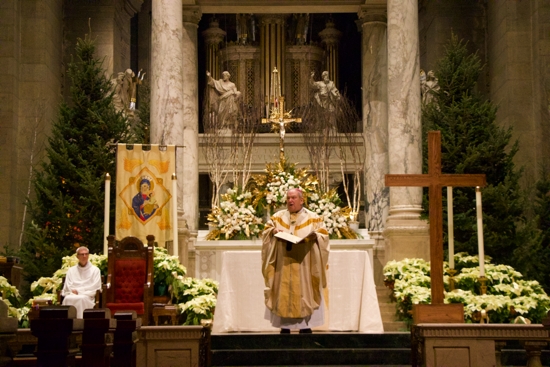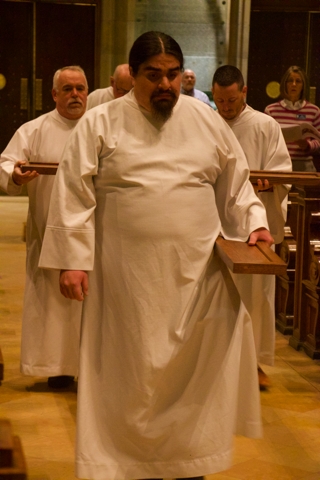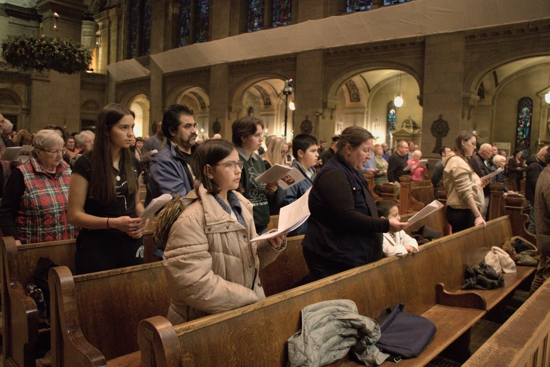
Marked by solemn processions and prayers for hope in troubled times, Archbishop Bernard Hebda presided over two opening Masses for the 2025 Jubilee Year, proclaimed by Pope Francis to carry the theme “Pilgrims of Hope.”
“And in the sign of the cross, anchor of salvation, we solemnly now open the Jubilee Year for the Church of St. Paul and Minneapolis,” the archbishop said Dec. 28 at the anticipatory Mass of the feast of the Holy Family of Jesus, Mary and Joseph, at the Basilica of St. Mary in Minneapolis.

“This rite is for us a prelude to a rich experience of grace and mercy,” the archbishop said. “We are ready always to respond to whoever asks the reason for the hope that is in us, especially in this time of war and disorder.”
Archbishop Hebda also presided at a Dec. 29 opening Mass at the Cathedral of St. Paul in St. Paul. Each of the co-cathedrals will have in their sanctuaries during the Jubilee Year special reminders of the year’s significance –– a large, wooden cross at the Basilica, and a large, ornate crucifix in the Cathedral.
Pope Francis inaugurated Holy Year 2025 by opening the Holy Door of St. Peter’s Basilica at the Vatican during midnight Mass Christmas Eve. He opened a Holy Door in a prison in Rome two days later, and Holy Doors were being opened at several major basilicas in Rome: St. John Lateran Dec. 29, St. Mary Major Jan. 1 and St. Paul Outside the Walls Jan. 5. In addition, Pope Francis asked bishops around the world to celebrate the solemn opening of the Jubilee Year on Dec. 29.
In his homily at Mass at the Basilica in Minneapolis, Archbishop Hebda recalled working at the Holy See in Rome when St. John Paul II opened the 2000 Jubilee Year.
“It’s a magnificent time,” the archbishop said. “It’s a moment, brothers and sisters, that should give you great joy. Because throughout this year, from now until the feast of the Holy Family next year, the Church is opening up her great treasury of graces.”

Gretchen Amigon, 45, a volunteer teacher of faith formation at the Basilica, came to the evening Mass with her husband, Antonio, 46, and their six children, ages 6 to 18. Gretchen Amigon said she was in Rome for the 2000 Jubilee Year, and she wanted to attend this year’s opening Mass.
“The theme of hope really speaks to me,” she said. “In our political world, I feel there is a dearth of hope.” Recalling the anticipation and fervor in Rome in 2000, Gretchen Amigon said she wants her children to know some of that same excitement.
“I think of all generations having this sense of hope,” she said.
In his homily, Archbishop Hebda outlined a path with four steps the faithful could take to participate as “Pilgrims of Hope” and in the grace of indulgences that are promised in this Holy Year 2025. The first step is performing a pilgrimage or spiritual activity, such as visiting one of the co-cathedrals in Minneapolis and St. Paul, or engaging in an act of charity for migrants, the elderly, someone in prison or living in poverty, the archbishop said.
“Any of those things, you would have the opportunity to get those graces of the Jubilee Year, provided that you made a good confession, went to holy Communion and then offered a prayer for the intention of the Holy Father,” the archbishop said.

Reflecting on the feast of the Holy Family and its significance for the opening of the Jubilee Year and for the Christmas season, Archbishop Hebda said three insights might be drawn from the passage in the Gospel of Luke about Jesus’ parents losing him at age 12 during the feast of Passover and finding him three days later in the temple in Jerusalem.
“The first, it’s easy to lose sight of Jesus in the hustle and bustle of daily life,” the archbishop said. “Even Joseph and Mary, whom we hold up as exemplars of family life, lost Jesus. They lost sight of him! We shouldn’t be surprised if this happens to us.
“We need to be committed, as were Mary and Joseph, however, to seeking out Jesus, to drawing close to him in the Jubilee Year and staying with him.
“Second insight is that the first place we should always go to find Jesus is in his Father’s house, doing his Father’s work,” Archbishop Hebda said. “In this Jubilee, as I mentioned, the Cathedral and the Basilica are both privileged places. We know that we can always find Jesus in these churches, and anywhere there is a tabernacle. … But the Jubilee reminds us that we’re also going to be able to find Jesus when we’re engaged in the works of mercy or works of penance.”
The third insight is that following Jesus means embracing sacrifice, “to pour ourselves out,” the archbishop said. In the family, that means a willingness to sacrifice for one another, “whether we be children, whether we be parents, whether we be a spouse, we need to pour ourselves out in imitation of Jesus.
“That, brothers and sisters, is a great goal for us this Jubilee Year,” the archbishop said. “Now, let’s not miss this opportunity that’s offered to us this year.”



